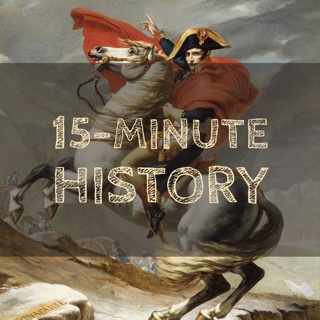
What If? | A Discussion on The Immolation of Hernán Cortés
Join us as we discuss What If? | The Immolation of Hernán Cortés.
9 Elo 202120min

What If? | Victory at Harbin
General Marshall had arrived early in 1946 with orders from Harry Truman to build a coalition government that included both Communists and Nationalists in China. Mao Tse Tung eagerly accepted Marshall’s intervention, continuing his public relations campaign to depict the Chinese Communist Party as kinder and gentler than its Stalinist counterpart in Moscow. But Chiang, who had chafed at having to accept help from the Americans during the war with Japan, rejected Marshall’s interference and refused to compromise with Mao. Frustrated by the Nationalists’ intransigence, General Marshall delivered an ultimatum in June 1946: agree to a ceasefire in Manchuria and open negotiations with Mao, or the United States would cut off all military aid to Chiang’s forces in the field. The proud Nationalist leader accepted these terms at first, and when talks broke down he tried to resume the advance. But it was too late. America kept its word and ended military aid to Chiang’s government, and Mao had used the brief respite to rearm his men with Soviet weapons. Within two years, Chiang Kai-Shek’s forces had been driven off the mainland onto the island of Formosa, where they formed the Republic of China, while Mao Tse Tung ruled the victorious People’s Republic of China from Beijing. What if Chiang had ignored Marshall’s ultimatum entirely, taken the Harbin stronghold, and then negotiated directly with Mao from a position of strength? Join us as we continue asking "What if", examine the effects of what might of happened, and wonder what our world might be like today.
26 Heinä 20218min

What If? | A Discussion on the Victory at Harbin
Join us as we discuss What If? | Victory at Harbin.
26 Heinä 202119min

What If? | A Lasting Peace at Tilsit
The raft floated in the midst of the River Niemen. On it were two beautiful pavilions, one for the Emperor of the French and the other for the Czar and Autocrat of All the Russias. In the French tent, Napoleon Bonaparte argued with his foreign minister, Charles-Maurice de Talleyrand, over how harsh the peace terms with the defeated Russians should be. Talleyrand, a servant of every revolutionary government since 1789, was a snake in silk stockings, but he knew foreign policy better than anyone else in the emperor’s entourage. He begged the emperor to treat Russia gently and put an end to fifteen years of war. But Napoleon, flush with the victory at Friedland earlier that year, was determined to humiliate Alexander I, and Talleyrand, ever the obedient servant in public, fell silent. What if Napoleon had heeded Talleyrand’s advice in 1807 and treated the Russians with more respect? What would our world look like today if history had taken a different course? In this series of bonus episodes on “15-Minute History,” Joe and I will be sharing some of our favorite “What If?” scenarios from this series with you. Building on the theme of Season Four, learning from history, we hope to provide some lessons on how individuals shape the destinies of large groups and entire nations.
12 Heinä 202110min

What If? | A Discussion on a Lasting Peace at Tilsit
Join us as we discuss, What if? | The Lasting Peace at Tilst.
12 Heinä 202118min

What We Left Behind | A Discussion on Season Four
Join us as we discuss Season Four of the 15-Minute History Podcast, ask each other questions we neglected throughout the season, and talk about Season Five and the bonus episodes you can expect during the break.
26 Huhti 202157min

The Nuremberg Trials | "Say I Slew Them Not"
Twenty-one men sat in the dock awaiting their fate. Once the leaders of Europe's mightiest nation who had strutted proudly across the world stage arrogantly proclaiming the supremacy of the Aryan race, their faces remained defiant as their empire lay in ruins outside. Some showed open contempt for the victors who now sat in judgment over them. Others sat quietly, their faces frozen and their eyes fixed forward. Some even looked surprised at having been charged with crimes against humanity, since they were "just following orders." Their leader, now dead, had commanded them to murder millions, and as good Germans, they had done just that. Now, with the world's most terrible war at an end, they would face justice. Join us as we teach you about the Nuremberg Trials, the monsters who faced justice, and the radicalism that corrupted an entire nation.
19 Huhti 202118min

The Nuremburg Trials | A Discussion on "Say I Slew Them Not"
Join us as we discuss the Nuremberg Trials, the monsters who faced justice, and the radicalism that corrupted an entire nation.
19 Huhti 202143min





















